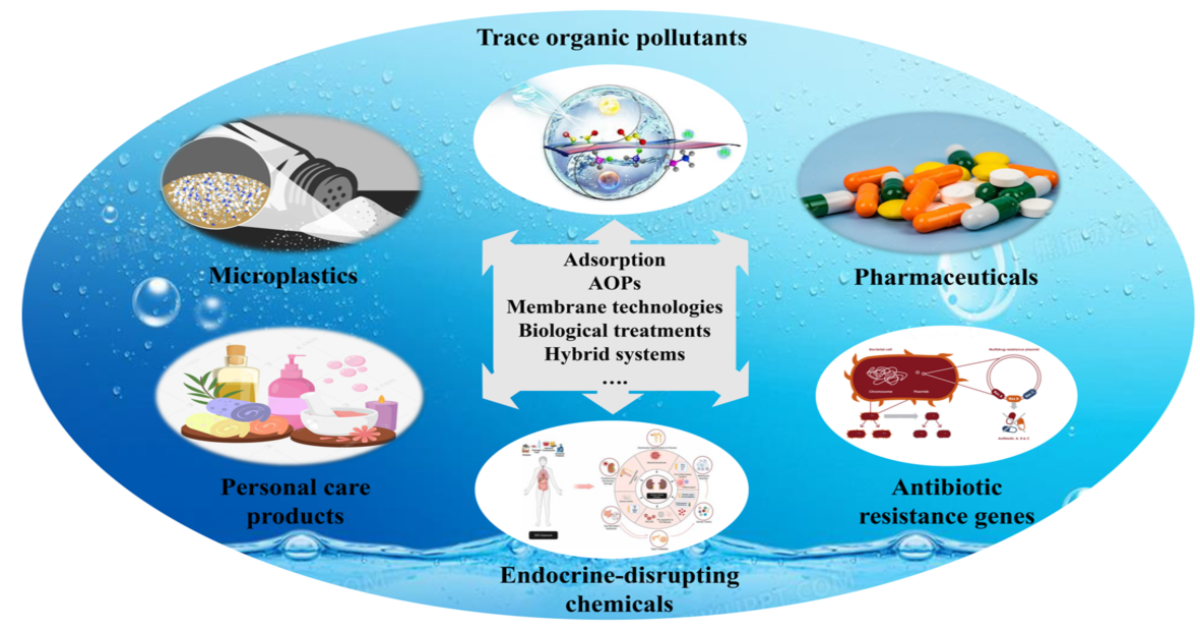Advanced Treatment Technologies for Emerging Contaminants in Wastewater
A special issue of Water (ISSN 2073-4441). This special issue belongs to the section "Wastewater Treatment and Reuse".
Deadline for manuscript submissions: 25 March 2026 | Viewed by 4025

Special Issue Editor
Interests: bioelectrochemical systems; electro-fermentation; wastewater treatment; emerging contaminant control; biomass recycling use
Special Issues, Collections and Topics in MDPI journals
Special Issue Information
Dear Colleagues,
Emerging contaminants (ECs), such as pharmaceuticals, personal care products, microplastics, endocrine-disrupting chemicals, and other trace organic pollutants, represent a growing threat to water quality and ecosystem health. Their persistence, bioaccumulation potential, and adverse effects on organisms have raised concerns among scientists, policymakers, and the public. Traditional wastewater treatment processes often fail to effectively remove these contaminants, necessitating the development of advanced treatment technologies.
Recent progress in materials science, bioengineering, and chemical processes has led to the emergence of innovative treatment methods for ECs, including adsorption, advanced oxidation processes (AOPs), membrane technologies, biological treatments, and hybrid systems. These approaches offer high efficiency and adaptability while contributing to sustainable wastewater management.
This Special Issue invites contributions that explore cutting-edge research and review papers focusing on advanced technologies for the removal of emerging contaminants from wastewater. Topics of interest include, but are not limited to, novel materials, process optimization, the integration of advanced treatment methods with existing systems, pilot- and full-scale studies, and assessments of environmental and economic impacts.
Dr. Xiayuan Wu
Guest Editor
Manuscript Submission Information
Manuscripts should be submitted online at www.mdpi.com by registering and logging in to this website. Once you are registered, click here to go to the submission form. Manuscripts can be submitted until the deadline. All submissions that pass pre-check are peer-reviewed. Accepted papers will be published continuously in the journal (as soon as accepted) and will be listed together on the special issue website. Research articles, review articles as well as short communications are invited. For planned papers, a title and short abstract (about 250 words) can be sent to the Editorial Office for assessment.
Submitted manuscripts should not have been published previously, nor be under consideration for publication elsewhere (except conference proceedings papers). All manuscripts are thoroughly refereed through a single-blind peer-review process. A guide for authors and other relevant information for submission of manuscripts is available on the Instructions for Authors page. Water is an international peer-reviewed open access semimonthly journal published by MDPI.
Please visit the Instructions for Authors page before submitting a manuscript. The Article Processing Charge (APC) for publication in this open access journal is 2600 CHF (Swiss Francs). Submitted papers should be well formatted and use good English. Authors may use MDPI's English editing service prior to publication or during author revisions.
Keywords
- emerging contaminants
- advanced treatment technologies
- adsorption methods
- advanced oxidation processes (AOPs)
- membrane filtration
- hybrid treatment systems
- bioremediation
- sustainable water management
- nanomaterials
- water quality restoration
Benefits of Publishing in a Special Issue
- Ease of navigation: Grouping papers by topic helps scholars navigate broad scope journals more efficiently.
- Greater discoverability: Special Issues support the reach and impact of scientific research. Articles in Special Issues are more discoverable and cited more frequently.
- Expansion of research network: Special Issues facilitate connections among authors, fostering scientific collaborations.
- External promotion: Articles in Special Issues are often promoted through the journal's social media, increasing their visibility.
- Reprint: MDPI Books provides the opportunity to republish successful Special Issues in book format, both online and in print.
Further information on MDPI's Special Issue policies can be found here.





